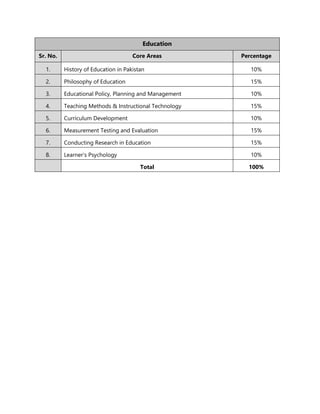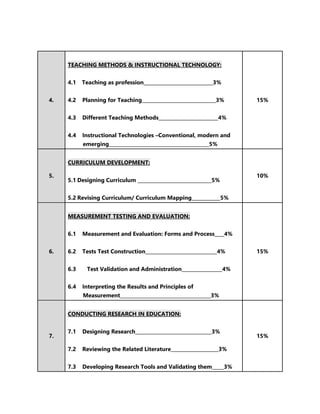Education.doc
- 1. Education Sr. No. Core Areas Percentage 1. History of Education in Pakistan 10% 2. Philosophy of Education 15% 3. Educational Policy, Planning and Management 10% 4. Teaching Methods & Instructional Technology 15% 5. Curriculum Development 10% 6. Measurement Testing and Evaluation 15% 7. Conducting Research in Education 15% 8. Learnerâs Psychology 10% Total 100%
- 2. Education (Detailed) Sr. No. Core Areas Percentage 1. HISTORY OF EDUCATION IN PAKISTAN: 1.1 Education system before partition-An overview___________________________________________2% 1.1 Educational development in Pakistan since 1947_______________________________________________8% 1.2.1 First Conference on Education 1947 1.2.2 National Commission on Education 1959 1.2.3 National Education Policy 1969/70 1.2.4 New Education Policy 1972 1.2.5 Education Policy 1978 1.2.6 Education Policy 1990 1.2.7 Education Policy 1992 1.2.8 Educational Policy 1998-2010 1.2.9 Education Sector Reforms 2002 1.2.10 National Education Policy 2009 10% 2. PHILOSOPHY OF EDUCATION: 2.1 Islamic Philosophy of Education_____________________7% 2.2 Modern/ Western Philosophy of Education___________8% 15% 3. EDUCATIONAL POLICY, PLANNING AND MANAGEMENT: 3.1 Policy Formulation, Decision Making and Planning Process____________________________________________4% 3.2 Educational Management__________________________3% 3.3 Developing Educational Leadership________________3% 10%
- 4. 4. TEACHING METHODS & INSTRUCTIONAL TECHNOLOGY: 4.1 Teaching as profession_____________________________3% 4.2 Planning for Teaching_______________________________3% 4.3 Different Teaching Methods_________________________4% 4.4 Instructional Technologies âConventional, modern and emerging__________________________________________5% 15% 5. CURRICULUM DEVELOPMENT: 5.1 Designing Curriculum _______________________________5% 5.2 Revising Curriculum/ Curriculum Mapping____________5% 10% 6. MEASUREMENT TESTING AND EVALUATION: 6.1 Measurement and Evaluation: Forms and Process____4% 6.2 Tests Test Construction______________________________4% 6.3 Test Validation and Administration_________________4% 6.4 Interpreting the Results and Principles of Measurement______________________________________3% 15% 7. CONDUCTING RESEARCH IN EDUCATION: 7.1 Designing Research________________________________3% 7.2 Reviewing the Related Literature____________________3% 7.3 Developing Research Tools and Validating them_____3% 15%
- 5. 7.4 Collecting Data and Analyzing______________________3% 7.5 Writing Research Report_____________________________3% 8. LEARNERâS PSYCHOLOGY: 8.1 Understanding the Learners and their Learning Needs______________________________________________4% 8.2 Application of learning theories______________________3% 8.3 Cognitive and Personality Development of Learners__3% 10% Total 100%





